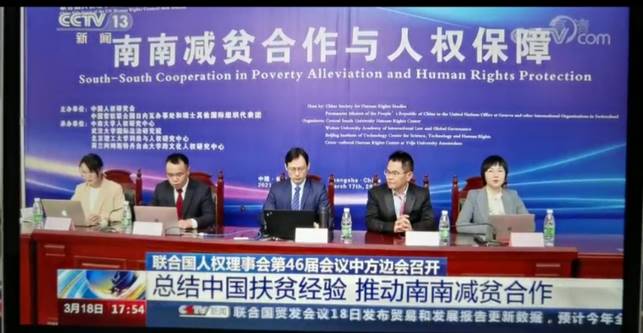On March 17, the South-South Cooperation in Poverty Alleviation and Human Rights Protection was discussed at a side-event to the 46thsession of the United Nations Human Rights Council held online. The side-even was convened both online and off-line. Central South University (CSU) was designated as the venue of the off-line conference. Nearly 20 experts and scholars from China, Germany, the Netherlands, Egypt, South Africa and Zimbabwe had an in-depth discussion on the South-South cooperation in poverty alleviation and human rights protection in light of China’s experience in combating poverty. Mao Junxiang, party secretary of CSU School of Law and executive director of CSU Human Rights Center, Xu Zhongyuan, Dean of CSU School of Law, and Yang Qingwang, Deputy Dean of CSU School of Law, attended the seminar.

The side-even was hosted by China Society for Human Rights Studies and co-organized by CSU Human Rights Center, Wuhan University Institute of International Law, the Center for Science, Technology and Human Rights at Beijing Institute of Technology, and the Cross-cultural Human Rights Centre of Vrije Universiteit Amsterdam. It was divided into three themes, that is “China’s Practice in Poverty Alleviation and Human Rights Protection”, “Cooperation in Poverty Alleviation Under Different Cultural Perspectives” and “Realization Path for South-South Cooperation in Poverty Alleviation and Significance of Human Rights”. The seminar was aimed at integrating the concepts and practices of poverty alleviation under different cultural perspectives, discussing the realization path for international cooperation in poverty elimination and human rights protection among developing countries, and providing China’s experience in combating poverty as a reference for poverty alleviation worldwide.
Building Consensus: Poverty Alleviation Should Be People-centered
“Targeted poverty alleviation is based on the people-centered approach. The policy is a good example of China’s people-centered development.” Tom Zwart, director of the Cross-cultural Human Rights Centre of Vrije Universiteit Amsterdam and professor of Cross-cultural Law at Utrecht University, pointed out that applying the people-centered approach to poverty alleviation is a good means of practicing the Universal Declaration of Human Rights. He added that China’s achievement in poverty elimination should be recognized and its experience is worthy of learning by other countries.
Xiao Junyong, professor of Law and deputy director of the center for science, technology and human rights at Beijing Institute of Technology pointed out that China’s poverty alleviation efforts attest to the Communist Party of China’s political commitment to putting people first. He noted that China’s achievement in poverty alleviation significantly enhances the sense of gain, happiness and security among poverty-stricken population, and it wins wholehearted support from all the Chinese.
Hany Georgy, president of North Cairo Court of Appeal and head of the fourth Labor Law Litigation Circuit at Cairo Court of Appeal, elaborated on China’s experience and achievement in poverty alleviation from the perspective of Egypt, from 3 aspects, that is how China’s achievement in poverty alleviation contributed to the human rights development worldwide over the past 8 years, its inspirations for South-South cooperation, and its inspirations for human rights protection in Egypt. He noted that China’s achievement of eliminating poverty provides an important impetus into Egypt’s poverty alleviation efforts, and that China’s historical achievement of eliminating absolute poverty is a victory for the Chinese nation and beyond.
Coordinated Development: Poverty Elimination Requires International Community’s Concerted Action
Hany Georgy, president of North Cairo Court of Appeal and head of the fourth Labor Law Litigation Circuit at Cairo Court of Appeal, noted that China’s great achievement of eliminating absolute poverty highlights its experience in reducing poverty and protecting poverty-stricken population, and it explores South-South cooperation’s bast practice of human rights protection in poverty alleviation.
Some countries’ vaccine nationalism in giving priority to their people’s access to COVID19 vaccines poses a threat to fair and equitable distribution of vaccines worldwide, said Serges Alain Djoyou Kamga, a human rights professor at the Thabo Mbeki African Leadership Institute of the University of South Africa, adding that this indicates that international solidarity, multilateralism, equality and global cooperation fail to address the pandemic and promote human rights worldwide.
In response, Otto Spijkers, professor at the China Institute of Boundary and Ocean Studies and the Research Institute of Environmental Law of Wuhan University, stressed the importance of global solidarity to poverty elimination. Dr. Peng Qinxuan, associate researcher at the Institute of International Law of Wuhan University, pointed out that as mankind, we share the same values, such as pursuing happiness, maintaining family values, and safeguarding human dignity. She added that South-South cooperation in human rights can enhance awareness of human rights, rule of law, gender equality and other shared values.
“Poverty is not only a global phenomenon, but also a problem of human rights,” said Mao Junxiang. He said that to eliminate poverty worldwide requires peaceful international and domestic environments, sustainable development, and international dialogue and cooperation. He added that it is each and every country’s responsibility to eliminate poverty, and it is each and every country’s human rights obligation to conduct international cooperation in poverty alleviation.
Source: CSU Human Rights Center











